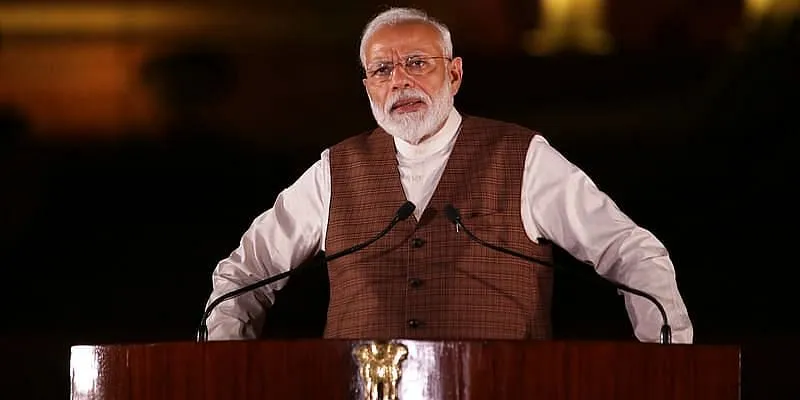PM Modi pitches for privatisation, says govt committed to selling non-strategic PSUs
PM Modi said about 100 under-utilised or unutilised assets with public sector units (PSUs), such as those in the oil and gas and power sectors, will be monetised, creating Rs 2.5 lakh crore of investment opportunities.
Prime Minister Narendra Modi on Wednesday made his strongest pitch for the privatisation of non-strategic PSUs, saying the government has 'no business to be in business' and sustaining loss-making units on taxpayers' money drains resources that could otherwise have been spent on public welfare schemes.
He said about 100 under-utilised or unutilised assets with public sector units (PSUs), such as those in the oil and gas and power sectors, will be monetised, creating Rs 2.5 lakh crore of investment opportunities.
"It is the government's duty to support enterprises and businesses. But it is not essential that it should own and run enterprises," the Prime Minister said at a webinar on the privatisation approach in the Budget for 2021-22.
The private sector brings in investment, global best practices, top-quality managers, changes in management and modernisation, he said, adding the money generated from the stake sales will be routed to public welfare schemes in areas like water and sanitation, education, and healthcare.
PM Modi said his government is committed to privatising all PSUs barring four strategic sectors — atomic energy, space and defence; transport and telecommunications; power, petroleum, coal and other minerals; and banking, insurance and financial services, where the government will retain a bare minimum presence.
"The government has no business to be in the business," he said. "Modernise and monetise is the motto we will follow."
PM Modi also said to speed up the disinvestment process, an empowered group of secretaries has been set up to settle investor issues.
The government has to focus on development and the public sector, and whenever it engages in business, it leads to losses, he said, adding that several loss-making PSUs are supported by taxpayers' money which otherwise should have gone into welfare schemes.
As much as Rs 1.75 lakh crore is being targeted from the sale of government stake in firms such as India's second-biggest oil firm BPCL, national carrier Air India, largest shipping line Shipping Corporation of India Ltd, helicopter services company Pawan Hans, , and Container Corporation of India in the next fiscal year beginning April 1.
This, along with an initial public offering of Life Insurance Corporation (LIC) and the sale of two public sector banks and one general insurance company, will be the largest disinvestment drive ever.
The government has already received "multiple expressions of interest" for the privatisation of Air India, BPCL, and Pawan Hans.
The Prime Minister further said the current reforms seek to ensure that public funds are used efficiently.
Stating that PSUs are valuable assets that have helped the country in the past and have huge potential in future, he said best global practices for proper price discovery and stakeholder mapping will be followed for the privatisation drive.
"Implementation is also important. To ensure transparency and competition, our processes should be right," he said.
"To ensure this, a clear roadmap for proper price discovery and stakeholder mapping has to be followed. We will have to learn from the best global practices. We will have to see that the decision that is being taken helps in the growth of that sector along with public welfare," he added.

Prime Minister Narendra Modi
PM Modi, who has in recent speeches underscored the importance of the private sector in building the economy, said the Budget for the fiscal year beginning April 1 has provided a clear roadmap for putting India on a high-growth trajectory again with a focus on private sector partnership.
The private sector's role is crucial in not just privatisation but also the Rs 111 lakh crore National Infrastructure Pipeline created to pull the economy out of the pandemic-induced slump, he emphasised.
The Prime Minister said state-owned firms were founded decades back when the Indian economy's needs and national priorities were different.
The policies that were right 50-60 years back, need improvement in today's changed circumstances, he said, adding the focus of the reforms has been to put pubic money to its best use.
But there are public sector enterprises that are loss-making and survive only on support by taxpayers' money, he said. "The money which is the right of the poor, right of youth is spent on these enterprises and hence this is burdensome on the economy."
"PSUs should not be run only because it is a legacy (enterprise) or because it is someone's pet project. If the public sector enterprise (PSE) is meeting the needs of any specific or important sector or has strategic importance, I can then understand it but not otherwise," he said. "Government focus should be on public welfare. When governments start to do business, it sometimes also leads to losses."
Running companies not just drains financial resources but also diverts human resources which otherwise could have been utilised for the administration of the country, he said.
"The government sector has a lot of under-utilised and unutilised assets, and we have announced a national asset monetisation pipeline. We have kept a target of monetising 100 assets in oil and gas, power and other sectors. It could lead to an investment of Rs 2.5 trillion and this process will continue in future also," he pointed out.
Pitching India as an investment destination, he said the country is now one market with one tax rate, has easier entry-exit norms for companies, simplified tax system and compliances are being eased.
"This is the time which will start a new phase in India's economic growth," he added.
Edited by Kanishk Singh








